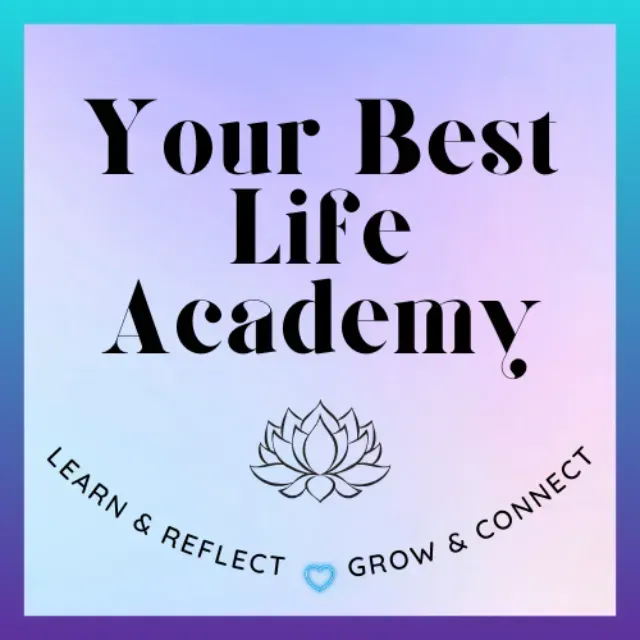Find Your Center: Karate as a Mindfulness Practice
Martial Arts & Being Present
Published: 3 September 2025
Looking for a way to feel more centered and present in your life? Karate isn’t just about self-defense — it’s also a powerful mindfulness practice.
In this post, we’ll explore how the discipline of martial arts can help you connect with your body, calm your mind, and find a sense of inner peace. Ready to discover how martial arts can bring balance and clarity to your life? Let’s get started.
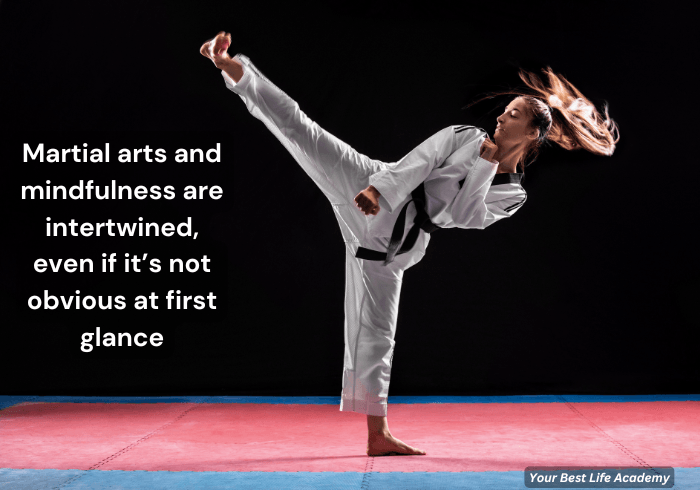
When I first started karate, at 19 or 20, I had no idea what an impact it would have on my life. I’d always been drawn to martial arts. Whenever I went somewhere, and found a martial arts class, I always wanted to stay and watch. I even started Tae Kwon Do when I was a child, but due to timing (around tea time, in peak hour traffic), it didn’t work out. I was excited to try it again, as an adult, when I could drive myself to the karate dojo (training centre), so I could finally learn a martial art – which would also help me get fit, learn self-defense, and challenge myself. So many benefits, all in one fun package! 😊
After a while, my weekly karate practice showed me that in addition to the physical benefits, it also had mindfulness benefits. Martial arts requires that you stay focused, present, and aware.
The Power of Staying Present
I learned early on in karate that if your mind wanders, even for a second, you’re in trouble. In sparring sessions, if you’re not fully present, you risk a fist or foot landing on your head or in your gut. There’s no room for daydreaming, or distractions. You must be fully in the present moment, aware of your opponent’s movements, your stance, your breathing, and your next move. Even if you’re not sparring, the Sensei will notice if you’re not paying attention, and call you out. Best to avoid that! 😉
This intense focus required I let go of worries about the past, present, or future, and simply be in the now. It was mindfulness in action — a fast-paced, moving meditation that required complete presence.
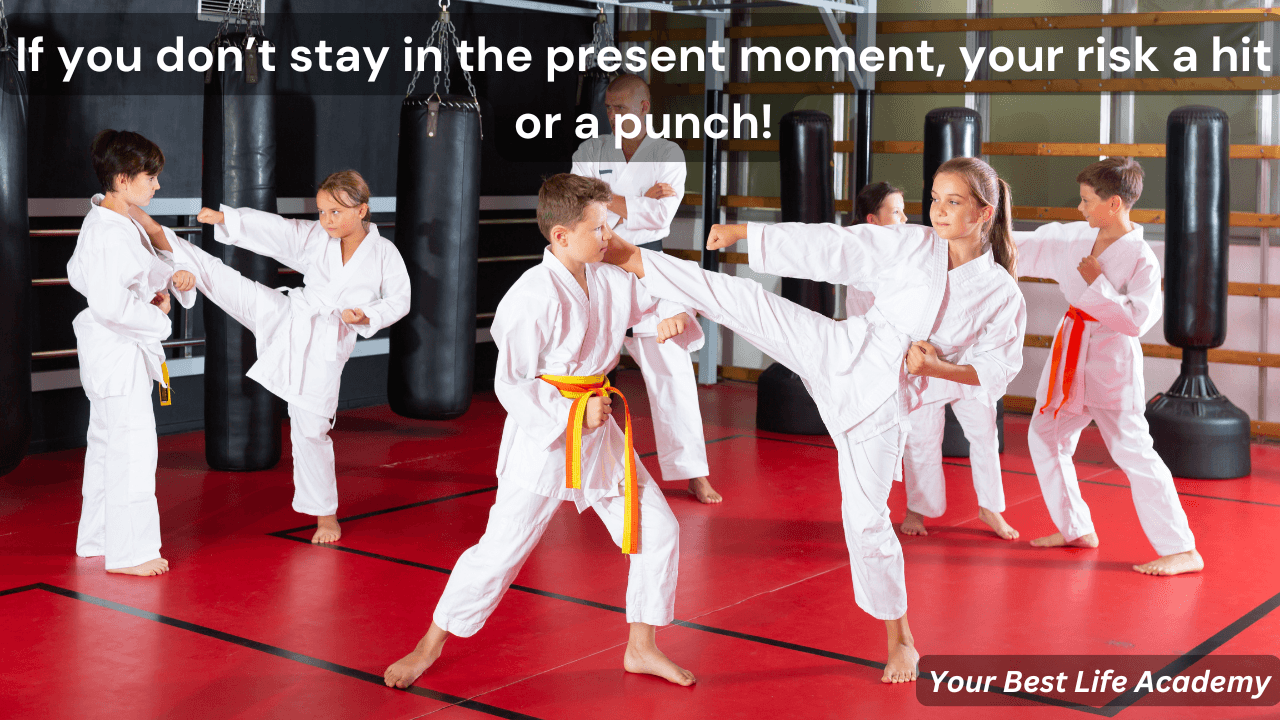
Discipline and Mindful Practice
Karate is also great for discipline (although I have to say mine was pretty good to start with). Training wasn’t just a casual hobby where I showed up now and then. I trained anywhere from 2 to 7 days a week, for 2 to 7 hours at a time (it changed a bit over the years). Being consistent taught me how important it is to show up, even when I didn’t feel like it (which, let’s be honest, happened more than once). 🤷
Discipline in karate isn’t just about being physically strong — it’s also about staying mentally strong. You learn to push through discomfort, be patient with yourself as you improve (which isn’t always easy!), and stick to the process. Sometimes I would feel like I’m not getting any better despite lots of regular training, which I found frustrating. Sensei would assure me that if I just kept going, I would keep improving, even if I couldn’t recognize it in myself. He mentioned that progress isn’t always linear, and that we can hit a plateau for a while — however, as long as you continued regular training, showing up, and doing the work, you would improve over time. This kind of discipline, and showing up even when you didn’t feel like it, often spilled over into other parts of life too, helping you tackle challenges with a calmer, and more mindful attitude. (Karate is also great stress release! 😊)
Awareness Beyond the Dojo (My Real-Life Examples)
One of the biggest mindfulness lessons I learned through karate was the importance of being fully conscious of your surroundings, and in the present moment.
In martial arts, in addition to focusing on your opponent, you also need to be aware of the area around you. If you don’t, then you or your opponent are likely to run into somebody else, which could result in injury.
In everyday life, or while travelling, this awareness helps keep you safe, and also helps to anticipate potential threats. There were a number of situations while travelling (and also at home) where my awareness of my surroundings caused me to change my plans, and get out of the way of potential danger.
For example, it could mean avoiding a fight before it starts (like in Australia), waiting for others to leave before leaving a train station so no one follows you (like in the U.S.), or realizing you're heading into a part of town that doesn’t feel right, and turning back.
One time in Greece, I was in a deserted area of town when a young guy (with his friends nearby) offered to show me a “shortcut” down a narrow alley to get where I was going — even though he didn’t know my destination. That mindfulness, and awareness, told me it wasn’t safe, so I trusted my instincts, and walked away (back where I came from, where there were more people).
I’ve had a few close calls overseas where I was so grateful for this awareness. My awareness of my surroundings (and tuning in to the energies around me), as well as the knowledge that I wasn’t helpless if it came down to it, helped me avoid situations that felt ‘off’ – but also gave me a sense of confidence that I could defend myself if needed – all of which made a huge difference. (This sense of confidence and situational awareness (and mindfulness) allowed me to travel all over the world, often alone.) Often, just knowing you’re prepared to challenge them if required, shows in your body language, and that alone can make others back off.
For instance, in Spain, I was walking uphill, putting some change in my fanny pack/bumbag while staying alert to what was going on around me. Two tall guys came up on either side of me, crowding me as I walked. I immediately covered my money, stopped in my tracks, took a step back, and gave one of them a challenging look. They glanced at me, then at each other, and kept walking, probably aware that we were in a busy part of town, and it was clear I would challenge them if they tried anything. It was the mindfulness of everything around me (gleaned from many years of martial arts) that allowed me to react in that manner.
Another time in England, I sensed a potential threat. I instantly changed my posture, standing taller, loosening my arms, and mentally and physically preparing to defend myself. I was feeling upset and angry, but I knew I was walking at night, and there weren’t a lot of people around, so even in the midst of feeling down, I still kept that mindful awareness of all that was around me. Nothing happened in the end, but that shift in body language made all the difference.
Mindfulness in Motion
Martial arts, while being a great physical workout, can sometimes also be considered a form of meditation. The repeated movements, focus on breathing, and attention to detail help you reach a calm, mindful state. You become more connected to your body, your breath, and your mind, all working together, as one.
On a training camp, I practiced karate while in the shallow end of the ocean. Sparring, as well as some other practices. As you can imagine, the sand under our feet was constantly moving, making it hard to keep our balance (especially on one leg)! The waves also tried to push us over - as I'm short, this unfortunately wasn't hard to do! This practice was designed to help us keep our awareness on the elements as well as on our opponents - and to work with the elements, to anticipate them, and to allow the 'flow' to work through us.
Practicing kata (a series of movements) feels especially grounding. It’s like a moving meditation, where every step, punch, and block is done with intention and focus. Kata helps you learn how to quiet your mind, and find peace while in motion. It’s an amazing way to feel centered and present in the moment – you have one focus, and your mind, body, and soul are all aligned.
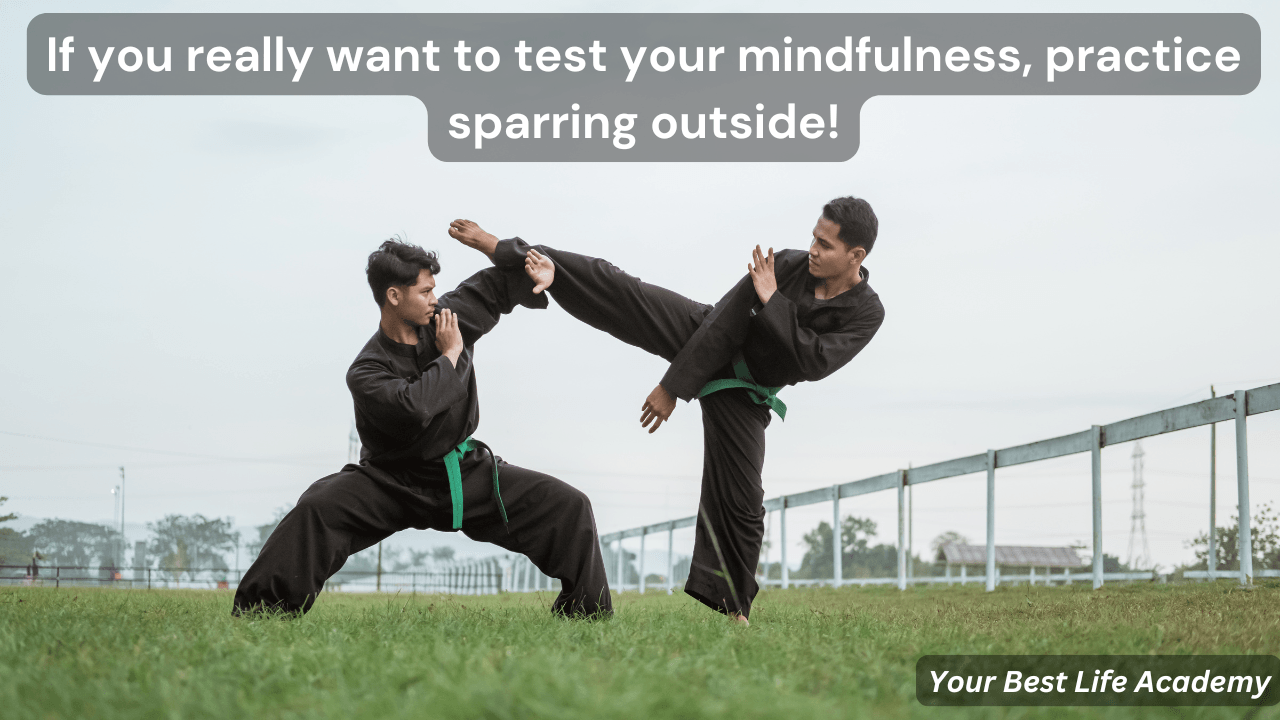
Lessons That Last a Lifetime
My years of martial arts training, in addition to teaching me self-defence, also taught me how to live mindfully. The training taught me how to stay in the present moment (for hours each day); to keep going even when you didn’t feel like it; to keep showing up, even if progress seems non-existent; and to pay attention to what’s happening around me. These lessons have stayed with me long after I stopped training in the dojo.
Mindfulness isn’t just about sitting still and meditating — it’s about being fully present, in the moment, in whatever you’re doing. Whether you’re practicing karate, talking to someone, or just going through your daily routine, mindfulness is about giving your full attention to the present moment.
Bringing Mindfulness to Your Life
While martial arts helps cultivate mindfulness, there are many other ways you can bring it into your life, for the same mindfulness benefits. I’ve mentioned a few ways below, that you can bring these lessons into your everyday life.
Stay Present — Try to fully focus on whatever you’re doing. Whether it’s working, exercising, or spending time with loved ones, give your full attention to that moment.
Breathe Mindfully — In martial arts, controlling your breath is key. Practice deep, slow breathing to calm your mind, and feel more grounded. You could even do this while walking — just really focus on your breath as you walk.
Build Discipline — Commit to regular habits that support your well-being, like exercising, meditating, or journaling. Keep this practice up, even on days when you don’t feel like it.
Stay Aware — Take a moment to notice what’s happening around you. Being alert can keep you safe, and help you feel more connected to the present.
Karate taught me that mindfulness doesn’t have to mean sitting still. It can also be an active practice. Whether you’re moving, or sitting quietly, mindfulness is all about staying focused, aware, and present in every part of life. And isn’t that what mindfulness is really about?
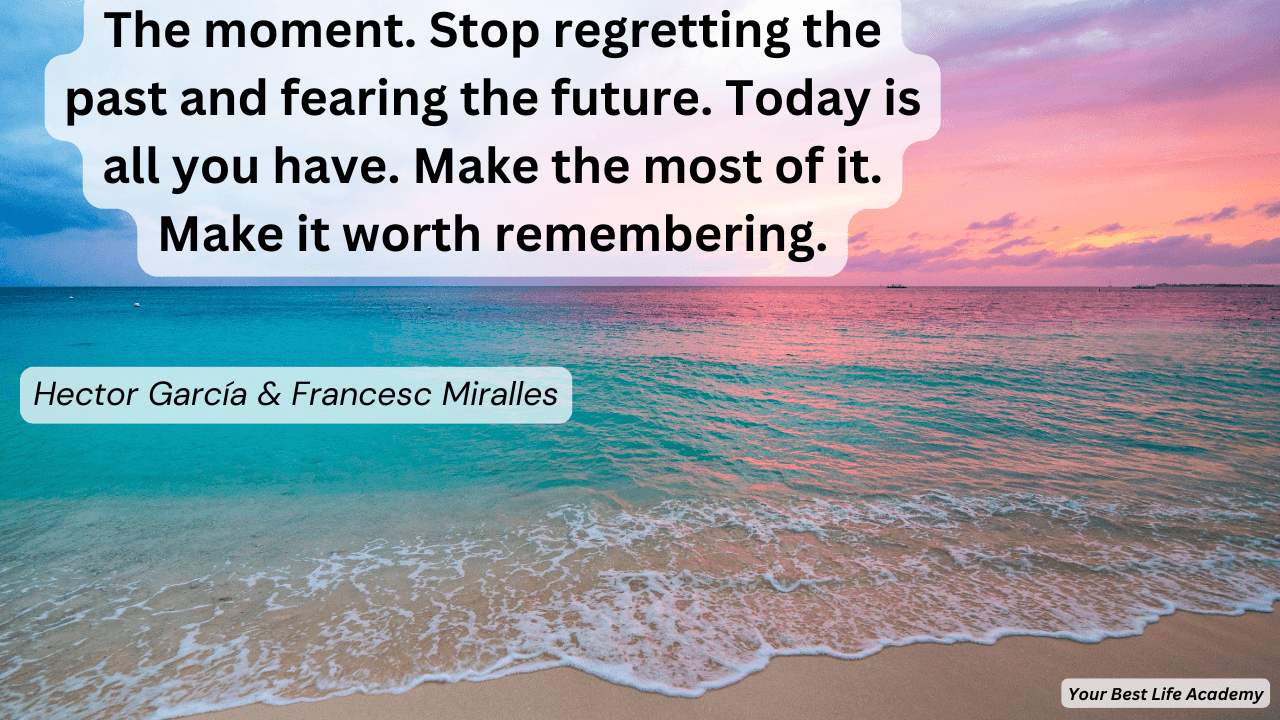
Final Thoughts
Karate offers much more than physical strength — it’s a powerful tool for cultivating mindfulness and finding your center. By embracing its practices, you can bring calm and focus into your everyday life, improving your mental and emotional well-being. Whether you’re seeking balance, clarity, or inner peace, karate can be the key to unlocking a more centered, mindful version of yourself.
Ready to take the first step toward a more balanced life? The journey begins with you.
🙋 Frequently Asked Questions
1. What’s the connection between karate and mindfulness?
Karate required you to stay focused, and being present, in the moment — if you’re not, you might end up with a kick to the head! Training helps martial artists develop mindfulness, by paying attention to what’s around them, controlling their breath, and fully focusing on their movements.
2. Can martial arts improve mental health?
Yes, martial arts like karate can help improve mental health. It reduces stress, sharpens your focus, and encourages a mindful and disciplined way of living. Plus, the exercise releases feel-good hormones called endorphins that can boost your mood.
3. Does karate help with stress?
Yes, karate is great for managing stress. The physical exercise helps release tension, as well as teaching mindfulness. By focusing on your breathing, and staying present, you can feel less anxious, and think more clearly.
4. Do I need to be fit to start karate?
No, you don’t have to be fit to start karate. Martial arts are usually active, and will help you develop your fitness as you go. Most instructors adjust exercises to match different fitness levels. Some even let you skip certain exercises, or take it slower while you build up your strength (eg. only do every second punch while training).
5. How does karate teach discipline?
Karate is all about regular practice, and following rules of respect and perseverance. It teaches you to show up, even when it’s tough, and to keep going, with patience. Often, even if you’re not in the mood to train, once you get there, the focus and routine help you feel better.
6. Can I practice karate mindfulness without doing a martial art?
Yes, of course! You can use karate-inspired mindfulness in your daily life by:
Practicing deep breathing (try it in the morning, at night, or whenever you remember).
Staying present during your everyday tasks, like cooking, walking, or brushing your teeth.
Noticing what’s happening around you.
Exercising while staying focused on the moment — it can become a mindfulness habit.
Being consistent helps you build mindfulness over time.
7. How is karate different from meditation for mindfulness?
Karate can be considered an active meditation. Instead of sitting still like in traditional meditation, karate combines movement, controlled breathing, and focus, to help you feel mindful.
8. Is karate good for all ages?
Yes, martial arts can be helpful for most ages. Many training centers have classes for kids, adults, and even seniors. It’s a fantastic way to stay healthy, in both body and mind, no matter your age. (Tai chi is a great martial art for seniors!)
9. Can mindfulness make me better at karate?
Yes, it can. Mindfulness improves your focus, awareness, and reaction time — all of which are important for karate. Being mindful can help you perform better during training and sparring.
10. What if I want the mindfulness, but don't have time to do martial arts?
There are other ways to practice mindfulness. You can go for daily walks, and live in the present moment, noticing the breeze and sun, the butterflies and bees, the sway of the trees, and the scent of the flowers. Or you can use our free Meditation for Beginners 7-Day Challenge, to help you with meditation and mindfulness.
📚 Additional Resources
If you're interested in mindfulness without doing martial arts, our free Meditation for Beginners 7-Day Challenge can help.
Want more practical ideas and thought-provoking content on a regular basis? Don’t miss out on all the hints & tips that you can implement over time! Sign up for weekly input to help you uplift your life – one week at a time!
We have also created stand-alone pages in the 7 life segments with all blogs, freebies, and paid products grouped together, so you can easily find and review items of interest to you. Click on the links below to find the areas of most interest to you!
Life Purpose & Best Life - Health & Wellness - Relationships - Abundance - Personal Growth - Peace of Mind - Spirituality & Energy.
📝 Disclaimer
The information in this blog is based on personal experience, and is shared for educational and inspirational purposes only. It is not intended as medical, psychological, or professional advice. Always consult a qualified health or fitness professional before starting any new exercise or mindfulness practice, including martial arts. Each person’s journey is unique — listen to your body, honour your limits, and move at your own pace.
Your Best Life Newsletter
Your Weekly Dose of Inspiration to Live Your Best Life!
✔️ Get practical tips to feel happier, healthier, and more fulfilled.
✔️ Discover easy ways to bring more joy and purpose into your life.
✔️ Be the first to know about new blogs, free resources, and special offers.
💌 Join our supportive community today — it's free!
